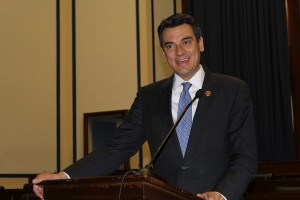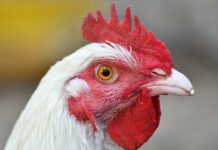WASHINGTON, D.C. — Using an analogy that even non-farmers could understand, U.S. Sen. Rob Portman explained to a group of Ohio Farm Bureau presidents the problem of having too many people living on government support.
Portman, of Cincinnati, said the question that needs asked is, “How many people are pulling the wagon versus how many people are in the wagon?”
One such wagon, the recently-passed farm bill, was about 80 percent food stamps and nutrition funding — with the other 20 percent going toward agriculture and conservation. Portman said he voted in favor of the bill because he supported the farm titles, but said he had concerns over the food stamp portion, which is at an historical high.
Related: Ohio Farm Bureau presidents go to Washington
Dependency
He also spoke critically of Obamacare and long-term unemployment — saying current policy often pays people more not to work than to take jobs that are available.
“There’s a disincentive for people to work if they get subsidies,” he said. “We’ve got to change government policies so that we’re incentivizing work.”
He said the long-term unemployed — those who are unemployed six months or more — should be required to complete training that would help qualify them for the jobs available.
“We got 400,000-plus people in Ohio who are out of work right now,” he said. “We also have 100,000 jobs out there that are open and there’s obviously a disconnect there.”
Portman’s comments were made during the annual Ohio Farm Bureau county presidents’ trip to Capitol Hill, March 3-5.
Explaining food stamps
Speaking from the other side of the aisle, Rep. Collin Peterson, D-Minn., said the reason food stamps are paired with the farm bill is because lawmakers from urban districts would likely not approve the farm bill if it were only a bill about farming.
Making the situation worse, Peterson said, are certain “environmental activists” who “misrepresent to the city people what you’re doing.”
While the greater portion of the farm bill does go to food stamps, Peterson said lawmakers have cracked down on food stamp abuse.
“Frankly, there’s more abuse and fraud in crop insurance now than there is in food stamps,” he said.
That was not a message farmers wanted to hear, but one Peterson insisted was true. He added that lawmakers are cracking down on both kinds of abuse, because both are real issues.
Thinking ahead
Rep. Bob Gibbs, R-Ohio, said lawmakers tried to make the new farm bill more conservative — partly because if it’s too generous, the next one will be even harder to pass.
For example, the current bill eliminates direct payments to farmers and spends about $14.3 billion less on farm commodity programs over 10 years, according to the Congressional Budget Office. At the same time, the bill increases crop insurance spending by $5.7 billion.
Safety nets
But Gibbs, who has a farming background and serves on the House Ag Committee, said farmers and the U.S. food supply deserve some kind of safety net, because some factors are beyond a farmer’s control.
“I believe it is important that we have a safety net program for American agriculture,” he said. “I say that for two reasons — one, we can’t control the weather; and we can’t always control bad government policy or even global policies.”
Less dependency
Rep. Kevin Yoder, R-Kan., said it’s important that farmer’s risks are backed up. He serves on the House Appropriations Committee, where he said he’s trying to appropriate funds that help create “opportunity, as opposed to creating dependency.”

Like Portman, Yoder said government dependency is growing to unsustainable levels. Yoder quoted some U.S. Department of Agriculture data that shows 53 percent of all babies born in the country are supported by funding through Women, Infants and Children.
“How do you build a future when over half of your babies are born onto a government welfare program the first day?” he asked. “That to me doesn’t lead toward the opportunity and freedom in this country that we all want.”
Natural gas
In other matters, lawmakers discussed ways to grow the U.S. trade market for agriculture, and also for natural gas.
Rep. Bill Johnson, R-Ohio, said the United States could send a message to Russia by beginning to export natural gas.
First, Johnson said, the U.S. should approve the Keystone XL pipeline, approve the exporting of liquid natural gas, and then tell the countries that depend on Russian gas that the United States is “open for business.”

Johnson said the eastern and southeastern part of Ohio has plenty of supply — the state just needs more infrastructure.
“It’s not the amount of the resource,” he said. “It’s getting the resource to the market, to the consumer.”
He is among the lawmakers who also support a new expansion of U.S. Route 30 in eastern Ohio, to help alleviate traffic issues on state routes and provide more efficient transportation in that region.
U.S. Route 30 currently runs about 240 miles across Ohio, from Indiana to West Virginia. It’s a four-lane highway — except for the stretch from East Canton east to state Route 11, where the road reduces to two lanes and is narrow and windy.
The project would be costly, but Johnson said the economic gains would justify the construction.











